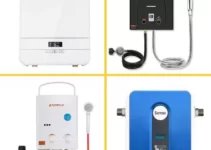Are you planning to upgrade your water heater? You have come to the right place! This complete buying guide will help you find the best tankless water heater 2023 for your home. Let us explore all the features and specs of these high-efficiency heating systems that are sure to meet all your hot water needs.
Best tankless water heater 2023
- Rinnai RSC199iN water heater (Editor’s Pick)
- EcoSmart water heater (Best Overall)
- Ecosmart ECO 36 Water Heater (Budget Friendly)
- Stiebel Eltron Water Heater
- Rinnai RUS75eP Water Heater
- RVMP FG-SBMC-11 Water Heater
- Rheem RH10DVLP Water Heater
1)Rinnai RSC199iN water heater
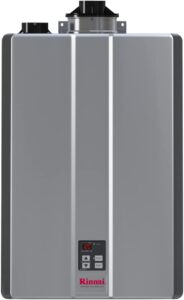
The Rinnai RSC199iN water heater is a great choice for storing hot water. It sources natural gas and has a 11 gallon capacity. This offers an energy efficient choice for those looking for a compact and easy-to-use water heater. The Smart-Circ technology ensures consistent temperatures and the durable design ensures a long lifespan.
Additionally, with an 11 GPM output, this water heater is perfect for areas that have higher constant water outputs. The compact tankless design is perfect for areas with limited space and makes it easy to install. In conclusion, the Rinnai RSC199iN water heater is an excellent choice for those who need a compact and energy efficient water heater with a high output.
2)EcoSmart water heater
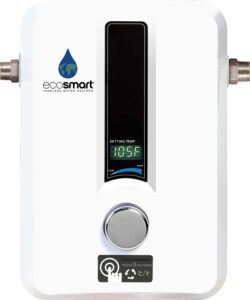
The EcoSmart water heater is a great option for eco-friendly users. It has a capacity of 2 gallons and is monitored for efficiency and performance. The 1-degree accuracy provides precise temperature control for hot water when needed. Additionally, the EcoSmart tankless water heater technology utilizes 99% thermal efficiency, meaning it saves energy with every use.
This 13-kilowatt heater is an efficient solution for those looking for an efficient water heater that is both economical and sustainable. The EcoSmart offers great value for cost and quick installation, making it an easy and simple choice for those looking for eco-friendly heating solutions. The lowered utility bills also make it a great financial decision for users.
3)Ecosmart ECO 36 Water Heater
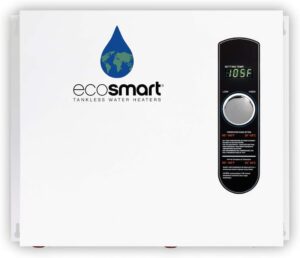
The Ecosmart ECO 36 Water Heater is an energy-efficient alternative to traditional storage tank water heaters. It is perfect for replacing any standard 7 gallons per minute tank and is designed to provide ample hot water while using less energy than standard electric models.
The sleek and compact design of the Ecosmart ECO 36 Water Heater make it ideal for installation in tight spaces and its 99.8-percent energy factor and 3/4 inch NPT plumbing connection allows for maximum efficiency. Additionally, it features a 150-amp breaker for maximum safety, and has a 6 gallon per minute flow rate, so you’ll never be left without hot water. The Ecosmart ECO 36 Water Heater is the perfect choice for anyone looking for an energy-efficient water heater that will provide ample hot water for their needs.
4)Stiebel Eltron Water Heater
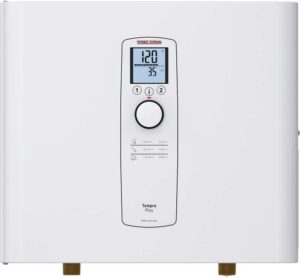
The Stiebel Eltron Water Heater is one of the best on the market. With its 18000 watts, it provides excellent heating power. It is also hard wired, so it can be securely installed in any home. The 24kW and 240V also provide excellent power output and energy efficiency.
The ENERGY SAVER technology ensures that your hot water needs are met and that there is minimal wastage of energy. As a result, you save on your electricity bills and make sure that the environment is not harmed. In addition, it is also easy to clean due to the 150A voltage level. The Stiebel Eltron Water Heater is an excellent choice for anyone looking for a reliable and energy efficient water heating solution.
5)Rinnai RUS75eP Water Heater
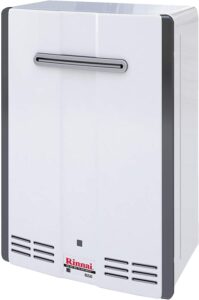
The Rinnai RUS75eP Water Heater is a powerful and highly efficient unit. It can be used for both indoor and outdoor installations and is made of durable Polyvinyl Chloride. It has a maximum flow rate of 6.5 GPM and is capable of delivering optimal water pressure.
It also features a twin-pipe arrangement to ensure that the water heated is evenly distributed throughout the system. Overall, it is an excellent choice for anyone looking for a reliable and power water heating solution. It has all the features needed to provide consistent hot water and is robust enough to handle all your needs.
6)RVMP FG-SBMC-11 Water Heater
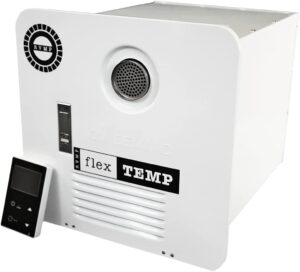
This RVMP FN-SBMC-11 water heater is an excellent choice for the home. It is a highly efficient and cost-effective way to heat your home’s water supply. It utilizes RVMP FleX patented technology to ensure consistent, safe, and dependable performance, and features a carbon monoxide sensor for added safety. Additionally, temperature protection is also built-in for added security and accuracy.
All of this is combined with a powerful, efficient water heater that will last for years to come. All in all, this water heater is an excellent choice for those looking for a reliable, effective, and affordable way to heat their home’s water supply.
7)Rheem RH10DVLP Water Heater
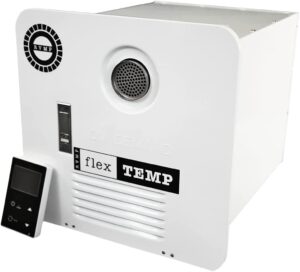
The Rheem RH10DVLP Water Heater is an ideal water heater for those wanting an appliance that offers both efficient performance and reliable long-term convenience. A 10 gallon capacity is ideal for larger households, and the low operating costs make this water heater an economical choice for long-term. Additionally, this water heater offers a unique Auto-Learn feature that automatically adjusts the water temperature and adjusts accordingly after one use, making it both energy efficient and user friendly.
Additionally, it comes with a Leak Detection system, so you can rest assured that a minor leak won’t go unnoticed and cause damage. The tank also includes a replaceable element, which allows you to replace a damaged part instead of having to replace the entire unit. This further reduces maintenance and running costs. Furthermore, the model comes with a selection of auto-programs, making it easy to maintain the ideal temperature and have access to hot water on demand. All of these features, combined with its high energy efficiency rating, make the Rheem RH10DVLP Water Heater a great choice for those looking for reliable performance and convenience.
Best tankless water heater 2023-Complete Buying Guide
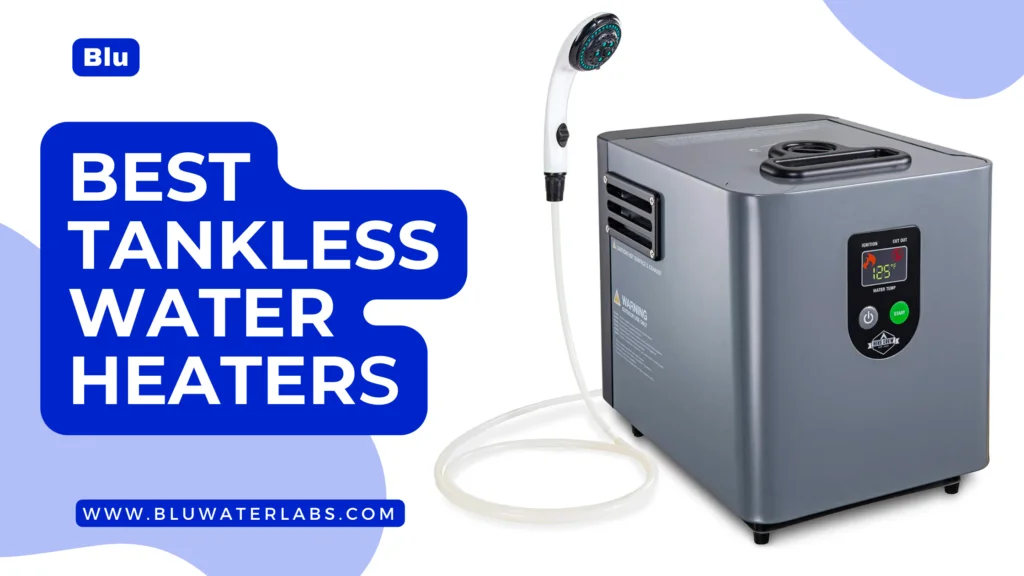
Photo Source : techbullion.com
Welcome to our buying guide and reviews of the best tankless water heaters of 2021. Tankless water heaters are becoming increasingly popular due to their energy-efficiency, space-saving capabilities and the fact that they provide an endless supply of hot water.
However, buying the right tankless water heater for your needs can be a daunting task. They come in different types, sizes, and power ratings with a variety of features and prices that might be hard to navigate for those who are new to them. To aid you in making an informed decision on which tankless water heater is right for your home or office, we have put together this buying guide – it contains everything you need to know about buying the best tankless heater as well as reviews of our top picks.
We will start off by explaining why you should buy a tankless water heater before going into detail on what you will need to consider when looking at models, like power ratings and temperature control options. After that review all the different types available followed by some frequently asked questions section around maintenance and installation. This all culminates in reviews of five top products currently available on the market in 2021 which we highly recommend for anyone looking for reliable hot water performance.
Definition of a tankless water heater
A tankless water heater is an energy-efficient and cost-saving type of water heating system. Unlike traditional, tanked water heaters, these units do not use tanks, but rather heat cold water directly when it is needed. They are usually powered by natural gas or electricity, but propane and fuel oil can also be used in some cases.
Tankless water heaters save energy by only heating a small amount of water at one time and providing that source of hot water when needed. Depending on their location in the house, they may also provide increased safety features due to avoiding potential danger associated with traditional tanked systems.
Installation costs tend to be higher than those of traditional tanked models, however the lifespan of a tankless heater is much longer than that of a tanked system allowing you to recoup more ways in household maintenance over its lifetime.
Benefits of a tankless water heater
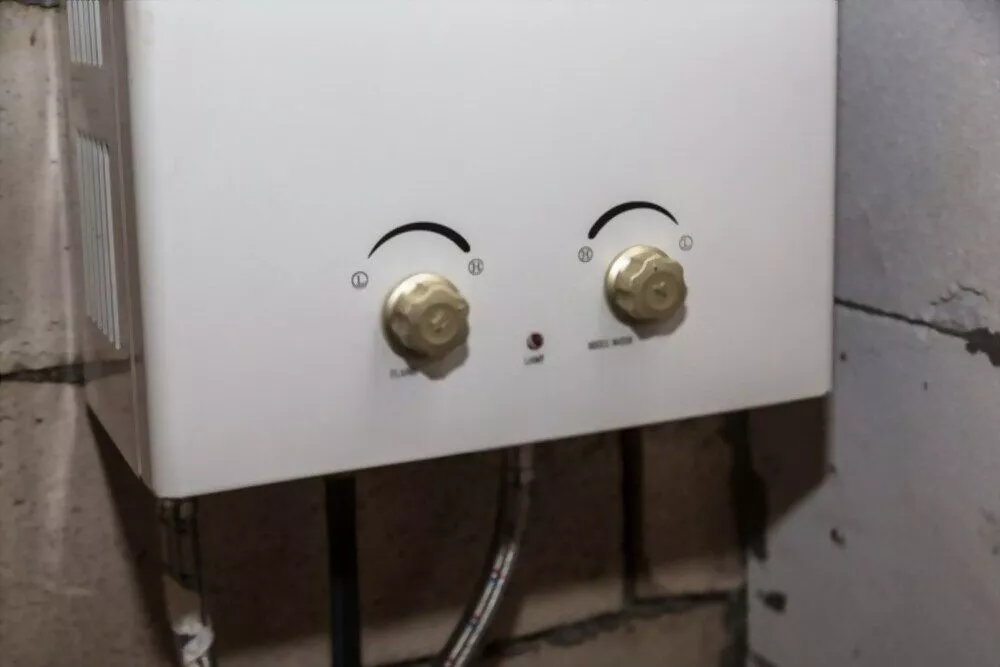
Photo Source : ricksplumbing.com
A tankless water heater has a number of advantages compared to traditional storage-tank systems. These units are far more efficient since they don’t continuously sustain heat like a tanked system, and as a result, they can save homeowners between 25%-50% in energy costs annually.
These systems also generate hot water on an as-needed basis and provide an endless supply of hot water, meaning no more cold showers! Furthermore, since these water heaters don’t require the large claw-foot tanks of the past, they are considerably smaller and can often be mounted to the wall to save space in your utility room or closet. Tankless systems also require less maintenance than traditional storage-tank models. However, many cities still have codes requiring annual maintenance for safety reasons.
Finally, some manufacturers offer models with remote control capabilities that allow you to activate your system from afar via a smartphone app or other device for added convenience.
Overview of the article
This article provides a thorough guide to purchasing a tankless water heater in 2021. It’s important to understand the different types of tankless water heaters available on the market, as well as the advantages and disadvantages associated with each type. We’ll look at some of the top-rated brands and models that are best suited for different homes, lifestyles and locations. We’ll also explore potential installation considerations which may help you decide whether or not tankless is right for you. By the end of this guide, you should have a better idea of which tankless water heater would be best for your needs.
We will start by introducing some key points about tankless water heaters such as their energy efficiency and continuous hot water supply benefits over traditional storage tanks systems. We will then discuss various technologies involved in tankless systems such as point-of-use, whole house, electric, natural gas and propane solutions. Next, we will cover the various features and functions offered with modern tankless heaters including temperature control features and safety features that protect you from unwanted scalding or poor maintenance issues. Finally we’ll finish up with some frequently asked questions about Tankless Water Heaters so you can make an informed decision when selecting yours!
Types of tankless water heaters
Tankless water heaters come in two distinct types – Gas and Electric.
Gas Tankless Water Heaters: These types of heaters use natural gas to produce heat and can be vented directly out the side of your home. They are typically more efficient than electric tankless water heaters and are also able to provide a higher volume of hot water. They may require more installation work than their electric counterparts, however.
Electric Tankless Water Heaters: Electric-powered tankless water heaters are becoming increasingly popular, due to their small size and relatively easy installation process. They use electricity to generate heat, which is then transferred into the water inside the heating chamber. While they can take longer to bring hot water to taps or showerheads than a gas-powered unit, they tend to be more energy efficient due to the lack of exhaust emissions associated with gas appliances.
Electric tankless water heaters
Electric tankless water heaters are the most popular choice among homeowners because of their compact size, ease of installation and low maintenance requirement. They are wall-mounted units that use a small electric element to heat water as it passes through the unit. Because they don’t require fuel storage tanks or permanent ductwork, electric tankless water heaters can be installed almost anywhere in the home.
They are energy-efficient since they only produce hot water when you need it, so you don’t have to worry about heating water unnecessarily or wasting energy by running an empty tank. Electric tankless models typically cost less than natural gas or propane models, but may require a higher initial investment because of their higher installation costs and special wiring requirements.
Gas tankless water heaters
Gas (natural gas or propane) tankless water heaters are a popular choice if you have access to cheap natural gas and propane. Gas water heaters provide more energy efficiency as compared to electric ones costing you less over time to heat your water. This type of tankless model offers fast hot water delivery, even when it is heavily used and runs at a low cost.
Gas tankless water heaters work differently than other types of tankless models. They have a built-in venting system that provides fresh air to the combustion chamber, allowing them to draw in the outside air that is needed for optimal combustion. The pilot light then ignites in order to begin heating the water inside of the tankless model as it passes through. This type of heating system typically works best when there isn’t an outside window or wall blocking off direct access from the combustion chamber.
Although these high-efficiency models come with higher upfront costs, they offer significant energy savings over time and provide hot water on demand for any occasion – whether it’s for a large shower or just one cup of tea! Boosting performance even further, certain gas tankless models are equipped with additional features such as recirculation pumps that reduce lag time significantly between use intervals, making sure that you get hot water at all times in your home!
Factors to consider when buying a tankless water heater
When you’re looking for the best tankless water heater for your home, there are several factors you should consider. Knowing your specific needs and understanding the options available on the market is key to finding the best value for your home. Here are some of the most important elements you should keep in mind when researching and buying a tankless water heater:
- Size: Tankless water heaters come in a variety of sizes. Depending on the size of your family and the amount of hot water you need, choose a heater with enough power to satisfy your needs without overpaying. The more power it requires, the larger it will be and vice versa.
- Fuel Type: Tankless water heaters come in electric, gas or hybrid models depending on your specific needs. Electric models are cheaper but require more energy to operate than gas-powered models. Gas-powered models tend to provide hotter water than electric since they can be adjusted easily, but they require ductwork installation which can be costly. Hybrid models are more energy efficient by combining stored hot water with an on-demand system that only heats up when needed.
- Flow Rate: The flow rate indicates how much hot water can be delivered at once from your system; this will depend on its capacity and power output as well as other factors such as local climate conditions or altitude levels for gas-powered systems. Make sure to check if this figure is going to meet your household’s hot-water needs before committing to a particular model.
- Installation & Maintenance: Most gas-powered tanks require professional installation since they must comply with local building codes; electric tanks are usually easier to install by yourself though unqualified persons should refrain from doing so due to safety reasons as well as manufacturers’ warranties requirements. In either case, sometimes special parts or tools might be necessary so beginners should seek professional help whenever in doubt about their capabilities or qualifications . Maintenance costs should also be taken into consideration before buying either type of tankless unit since some repairs may require specialized tools or experts visits.
Size and capacity
When shopping for a tankless water heater, one of the first things to take into consideration is size and capacity. Tankless water heaters are available in a variety of sizes, from small units that are installed under the sink, to larger units that can be mounted on a wall.
- Smaller units typically range from about 1 to 3 gallons and can easily provide enough hot water for an individual or limited family unit.
- Larger tankless water heaters are best suited for larger families or businesses with higher hot water needs. These types of systems can run up to 8 gallons per minute and provide hot water on demand.
- Depending on your usage, you may also want to consider investing in a unit with multiple outputs so that you can use it in different locations at once.
Flow rate
Flow rate is one of the most important features to consider when selecting a tankless water heater. The flow rate is the measure of how much hot water is available on demand and in a minute. A higher flow rate is essential when you have multiple fixtures, like multiple showers and other appliances, running at the same time. Many are measured in gallons-per-minute (GPM).
Some tankless water heater offers up to 10 GPM depending on their model, which can support usage for an entire family. However, it may be necessary to purchase more than one heater if your use demands a higher GPM rating. Regardless of how many tankless heaters you purchase, each has a potential flow rate; hence it’s important you choose your model carefully. This information can be found in product manuals or through manufacturers’ websites.
Conclusion
In conclusion, purchasing a tankless water heater can be a daunting task. There are many aspects that need to be taken into consideration when deciding which model is best for you and your home. Factors such as ambient temperature, incoming water temperature, capacity needs, fuel type preference and budget should all be taken into consideration during the selection process.
However, we are confident that after researching the various models of tankless water heaters available in 2021-2022 and taking the factors stated above into account, you will have no trouble finding the best one for your home.
FAQ’s
How do I choose a tankless water heater?
When choosing a tankless water heater, make sure to consider the size and capacity you need for your home, the type of fuel or energy source the heater uses, the temperature you need to heat the water, the installation cost and complexity, and any additional features available. Research online reviews from customers and experts to help compare the different models, and seek guidance from a professional installer to determine the best type and model for your home.
What are two disadvantages of a tankless water heater?
- Initial Upfront Cost: Tankless water heaters can be expensive both to buy the unit and to have it installed correctly. Depending on the water heater and the installation, a tankless water heater can cost up to three times as much than a traditional water heater. 2. Limited Flow Rate: Tankless water heaters are limited in their flow rate, or how quickly they can heat water. The heated water can only be provided as quickly as the system can heat it up, so multiple fixtures or applications running at the same time can quickly push a tankless system to its limit. This can lead to lower water temperatures and weak water pressure.
What size tankless water heater is recommended?
The size of tankless water heater needed depends on several factors, including the size and configuration of your home, the temperature of the incoming water, and the amount of hot water you require. It is recommended to speak with a professional to help determine the correct tankless water heater size for your home.
Can bacteria grow in tankless water heater?
No, bacteria cannot grow in tankless water heaters because they do not have the standing water that is required for activated bacteria to thrive. A tankless water heater only delivers hot water on demand, which means the water doesn’t remain in the unit long enough for bacteria to grow.
What is the lifespan of a tankless water heater?
The lifespan of a tankless water heater will vary depending on several factors, such as the type of unit and the maintenance it receives. Generally speaking, tankless water heaters can last anywhere from around 10 to 15 years with proper maintenance.
What type of water heater is the most efficient?
The most efficient type of water heater is a heat pump water heater. Heat pump water heaters use a heat pump to draw heat from the surrounding air and transfer it to the water, making them more efficient than traditional storage water heater systems. They also tend to have higher Energy Star ratings.
How much is annual maintenance for tankless water heater?
The average annual maintenance cost for a tankless water heater is between $175 and $250.
What are the advantage in disadvantage with tankless water heater?
Advantages:1. Space savings: Tankless water heaters do not require a storage tank, thus taking up much less space than traditional water heaters.2. Longer life span: Tankless water heaters can last up to 20 years, while traditional water heaters can last only up to six years.3. Hot water on demand: With tankless heaters, hot water is ready when you need it, without having to wait for a tank to fill up.4. Low energy use: Tankless heaters use less energy than traditional water heaters as they do not have standby heat loss from a storage tank. 5. Lower utility bills: Because tankless water heaters only heat the water you need, bills can be significantly lower than with traditional water heaters.Disadvantages:1. Higher initial cost: Tankless water heaters can cost up to three times more than traditional water heaters.2. Lower hot water flow rate: Tankless water heaters may struggle when hot water is being used by multiple fixtures at the same time, such as in a shower and laundry.3. Higher maintenance costs: Tankless water heaters require more frequent maintenance than traditional heaters.4. Sediment build-up: With traditional water heaters, sediment can accumulate at the bottom of the tank, but with tankless water heaters, this sediment can build up on the interior of the unit itself.5. Limited hot water supply: Tankless water heaters are limited in their ability to store water and are not powerful enough to meet high hot water demands, such as for a washer and shower at the same time.
How many hours a day does a tankless water heater run?
Tankless water heaters typically run for 2-3 hours a day.
Do tankless water heaters use a lot of electricity?
Yes, tankless water heaters use a significant amount of electricity compared to traditional tank water heaters. Depending on the size of the tankless water heater and how often it is used, it can use up to 3-5 times as much electricity as a regular tank water heater.


